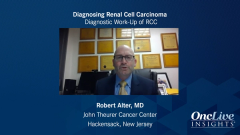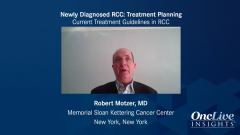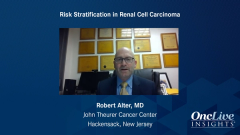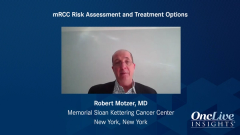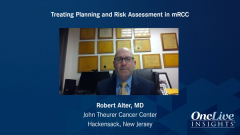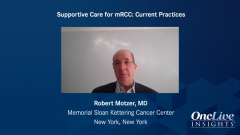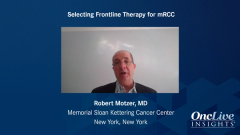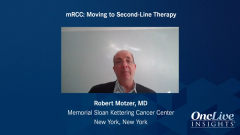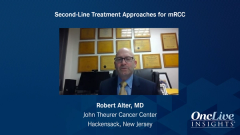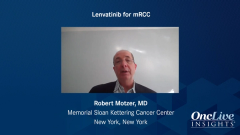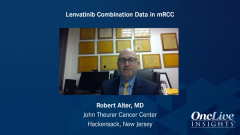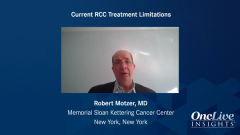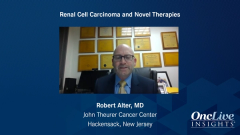
Current RCC Treatment Limitations
Health care experts remark on current unmet needs associated with the use of novel therapies, such as immunotherapies, and targeted treatments for metastatic renal cell carcinoma and share advice on best practices when managing patients in the community.
Episodes in this series

Robert Alter, MD: Regarding unmet needs, we’ve been talking about the biomarkers and the predictability of the therapeutic agents the patients receive. We have to discuss if a single agent may be for patients in the favorable-risk category, like those patients in the CheckMate 214 trial, for example. There are some physicians who, despite the fact that the data utilizing oral TKI [tyrosine kinase inhibitor] therapies is a favorable risk, do not see it as the best way of assessing the patients’ long-term benefits.
A biomarker may be helpful when it comes to toxicities, efficacies, mechanisms of action, and the uses of therapies. A desire that every physician has is a sequencing process for our concerns. Are we just going by habit forming? Are we going by the science? Are we going by gut instinct, or is there a benefit that we can have? Can we have a study that actually looks at sequence?
The PDIGREE clinical trial is looking at that. Patients received 4 cycles of combination of ipilimumab and nivolumab. Then, based upon the complete response, you continue to receive nivolumab. With disease progression, you have the change to Cabometyx [cabozantinib] therapy. Regarding the sequencing question, if you do not have progression and you do not have complete remission, these patients are then randomized to nivolumab vs a combination of cabozantinib-nivolumab.
These are questions that will be helping us define our patients and sequencing. There is more to the science when we monitor these patients, utilizing these mutations and markers. Clinically, and especially for the community oncologists—and I am 1—this can help us drive our approach to patients’ initial discussions, goals of therapy, and also their long-term treatment care.
Robert Motzer, MD: In terms of unmet needs, there is always a need for better therapeutics. We certainly have improved survival rates. The survival rate tripled from the cytokine era to the TKI era, with the median survival overall being about 30 to 32 months with TKIs. Now the overall survival rate is being extended longer and longer with I/O [immuno-oncology] therapy. We have made dramatic improvements in treating this disease with our therapeutics, but the complete response rate is still low. We may be curing some patients, but we need to cure more patients with metastatic diseases. We also need to develop regimens that have less toxicity to associate with a better improvement of life.
Another goal is to develop treatment programs that do not require a continued therapy. Perhaps there is a finite course of therapy that is effective, and then patients can be spared further therapy. That is an unmet need. There is an unmet need to identify effective adjuvant therapy for people who have had a nephrectomy are or at high risk for relapse. There is really no adjuvant program that clearly benefits patients, in my opinion. In that setting, I/O therapies and I/O combinations are being studied. That will hopefully be effective adjuvant therapy. That is a huge unmet need.
There is an unmet need to better understand the underlying biology of RCC [renal cell carcinoma]. For many years, studies of underlying biologists and bench research in RCC were really understated, almost ignored. That has changed, with the excitement that has been achieved with our gains in therapeutics and, as people start to get more sophisticated in looking at the underlying biology, the more they look into RCC, the more they find. Pursuing this aggressively and looking at underlying biology are both unmet needs when treating this disease.
Robert Alter, MD: As a community oncologist, in my discussions with community oncologists, it is important that you go back to the basics to think about the patient in front of us, about their disease, about the patients’ comorbid conditions. Categorize the risk. Plug in their systems. The NCCN [National Comprehensive Cancer Network] Guidelines are data driven. It is quite important to treat our patients based on data compared with forming habits. Going into clinical trials and tertiary centers are quite important. Some patients have unique histologies, which is important to communicate with physicians who may be able to offer patients clinical trials. Hereditary conditions are quite concerning to patients developing these diseases at a young age.
We at John Theurer Cancer Center refer our patients to the NIH [National Institutes of Health], and they have a large database on how to take care of patients, which is quite important. There should be a multidisciplinary approach. Your patient is a significant value. They should trust in you, so they believe you envision them as not just a patient who you have an initial treatment for as a first-line therapy but also how they can benefit from a sequencing of many therapies, ultimately causing them to improve the efficacy and tolerability of the therapy, potentially curability, and improving their functional quality of life.
Transcript edited for clarity.


